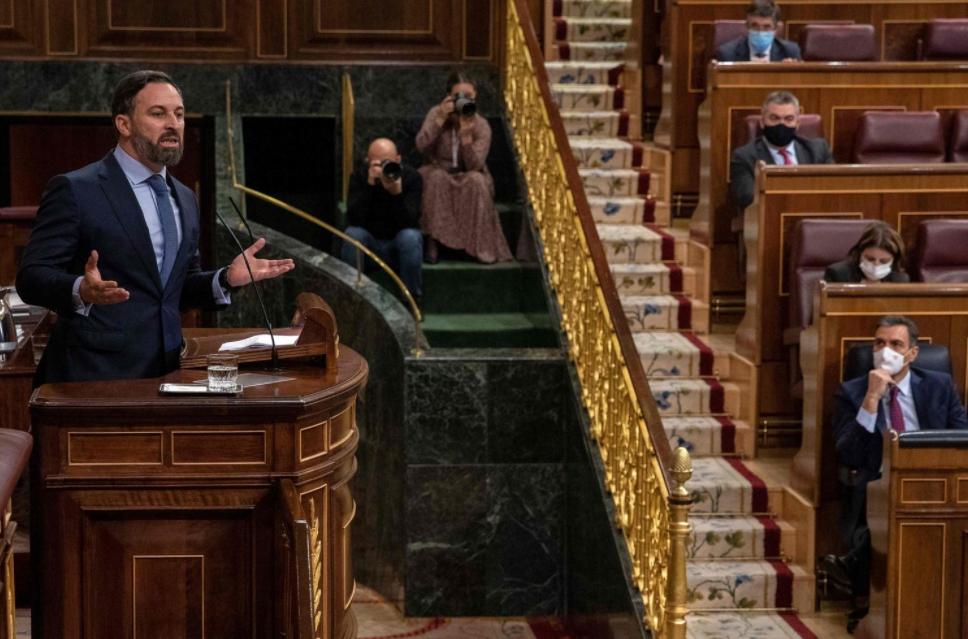In a surprise move, Popular Party leader Pablo Casado launched a scathing attack on the far-right group in Congress today, symbolically breaking all links with its leader Santiago Abascal
At the end of a two-day debate, the motion of no-confidence tabled by far-right party Vox failed on Thursday, as was expected. The group only managed to secure the votes of its own deputies in Congress in its bid to oust Prime Minister Pedro Sánchez from power, with all other parties voting against the initiative. A total of 350 votes were cast, with 52 in favor and 298 against.
Party leader Santiago Abascal, who was the candidate to replace Sánchez, thus obtained the worst result ever from the five motions of no confidence that have been debated in Spain’s Congress of Deputies since the country returned to democracy at the end of the 1970s.
Given the extremely high political tensions in Spanish politics since the coronavirus pandemic took hold, the debates on Wednesday and Thursday were surprisingly controlled, albeit reflecting extremely deep rifts between the groups in Congress.
The big surprise of today was the much-anticipated appearance of Popular Party (PP) leader Pablo Casado. After two years of trying to keep Vox in check, Casado definitely broke off with the far-right group on Thursday, launching a scathing attack on its proposals and its leader, Santiago Abascal.
In just 16 minutes at the lectern, Casado destroyed all of the arguments and ideas proposed by Abascal during the debate, and – at least symbolically – broke all of his links with the far-right party, despite the fact that the PP depends on its votes in order to govern in a number of regional and local administrations, including Madrid and Andalusia.
The PP chief – who garnered the conservative party’s worst-ever result at the April 2019 general election when he shifted its policies further to the right to compete with Vox – went so far as to personally attack Abascal, who spent years in the PP himself before co-founding Vox. “It’s not that we aren’t daring enough or that we have given in or that we are cowards,” he said. “No, it’s just that we don’t want to be like you, we are not like you.”
In response, Abascal expressed his surprise at Casado’s approach, saying it had left him “puzzled.” After Casado concluded, sources from the PP began to talk about a “turning point” and “new era” for the party.
Casado had not given such a personal speech since the era when he was one of the young national vice-secretaries appointed by former PP Prime Minister Mariano Rajoy in a bid to renew the party. What he said today in Congress was free of the nuances or ambiguous interpretations that were seen on other occasions. The text, which he had penned himself, made clear that there was nothing that unites him with the far right and Vox’s aggressive plans. Sources close to him explained that he had carefully planned his approach, and that this was why he waited until the last minute to reveal how the PP would vote in the motion. Casado was seeking – and achieved – a dramatic moment.
“In politics, what isn’t possible is false,” he began by saying to Abascal, with whom until recently he maintained a good personal relationship and had regular contact. Casado went on to accuse Vox of wasting everyone’s time with a useless motion in the midst of the second wave of the coronavirus pandemic, when a million infections have just been confirmed in the country. “Much ado about nothing, like everything that you do,” he said during his address.
He went on to condemn Abascal’s personal project of “hatred, fury and noise,” and accused him of strengthening the Socialist Party (PSOE)-Unidas Podemos coalition government, just when it was at its weakest. “The left has been wanting a party like Vox for 30 years,” he said, causing Abascal clear discomfort. “You have gifted it to them.”
He continued: “What you want is not to change the government, something you know full well you can’t do, but rather to supplant the PP. But abandon all hope. You are not the first to try it but I assure you that you will be the last.”
Casado also reproached Abascal for his “disloyalty” to the PP, for whom he worked for 15 years, given that he had never had a good word for the group. “The old PP has returned, you have taken off your mask,” Abascal responded. “You have signed up to the savage caricature of Vox and Abascal, whom you know well and know that is not like this. I didn’t expect your speech to be like this, I’m sorry for what you have done, damaging the hopes of thousands of Spaniards with an impossible equidistance.”
The Vox leader did clarify that the party would not withdraw its support for the PP in regional governments such as those of Madrid, Murcia and Andalusia, “out of responsibility.” However, shortly after Casado’s address, Vox announced that it is suspending talks on the 2021 budget blueprint with the regional government of Andalusia.
The deputy prime minister, Unidas Podemos leader Pablo Iglesias, asked to speak in the name of the government. From the lectern, he heaped praise on the moderate and intelligent messages from Casado, albeit lamenting that they arrived so late. On behalf of the PSOE, the party’s spokesperson in Congress, Adriana Lastra, also expressed gratitude from the PP leader for the new attacks on the far right, but with a note of mistrust. “Show that your ‘no’ today is not an opportunistic gesture,” she challenged. “Or will you continue to govern tomorrow hand-in-hand with fascism? Mr Casado, let’s talk about what Abascal does not want. Politics cannot be all about confrontation and deadlock.”
Following Casado’s speech, Sánchez asked for a turn at the podium and offered the PP “to stop the clock” on his government’s controversial reform project to renew the membership of Spain’s legal watchdog, the General Council of the Judiciary (CGPJ), which has been functioning ad interim for the last two years. The reform project has been criticized by European institutions and legal associations, and on Thursday the PP reiterated that Sánchez must withdraw his proposal and leave Podemos, the junior partner in the coalition government, out of any future negotiation.



